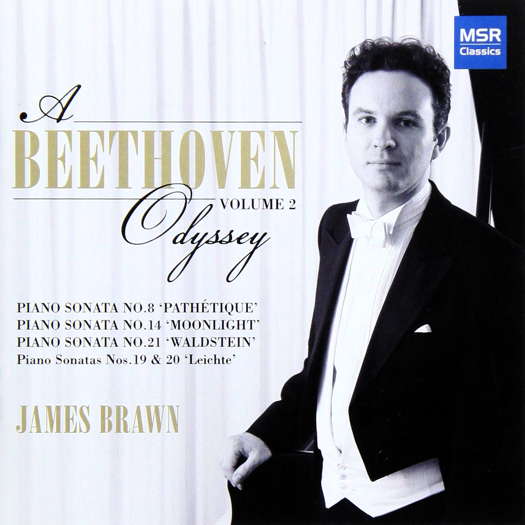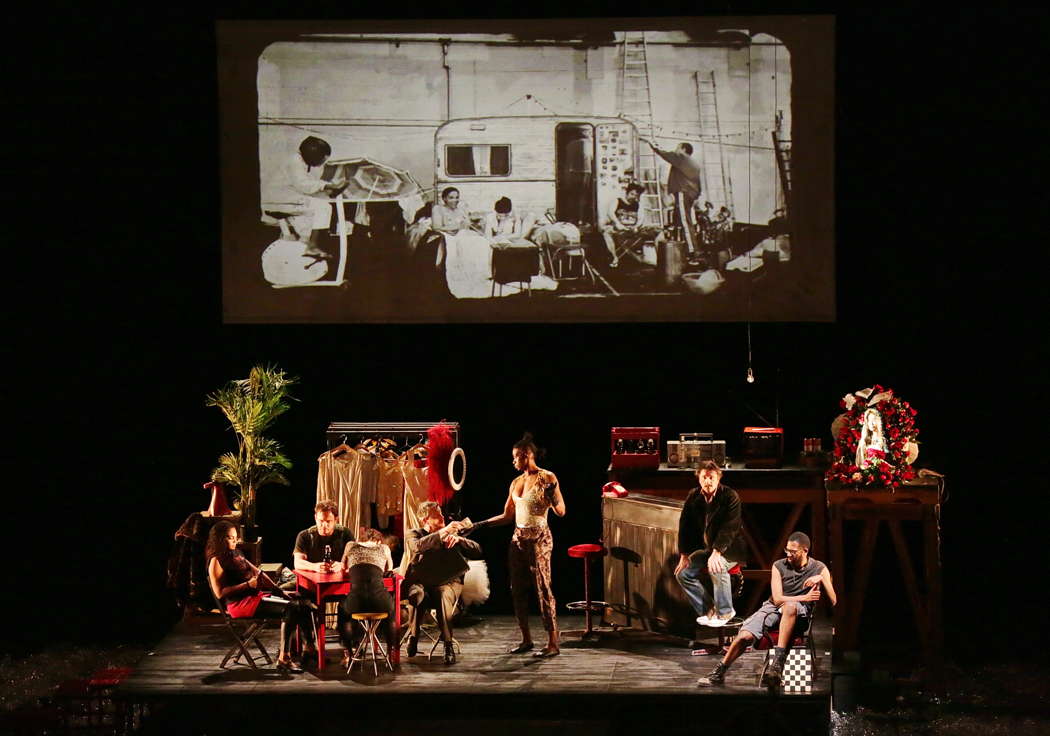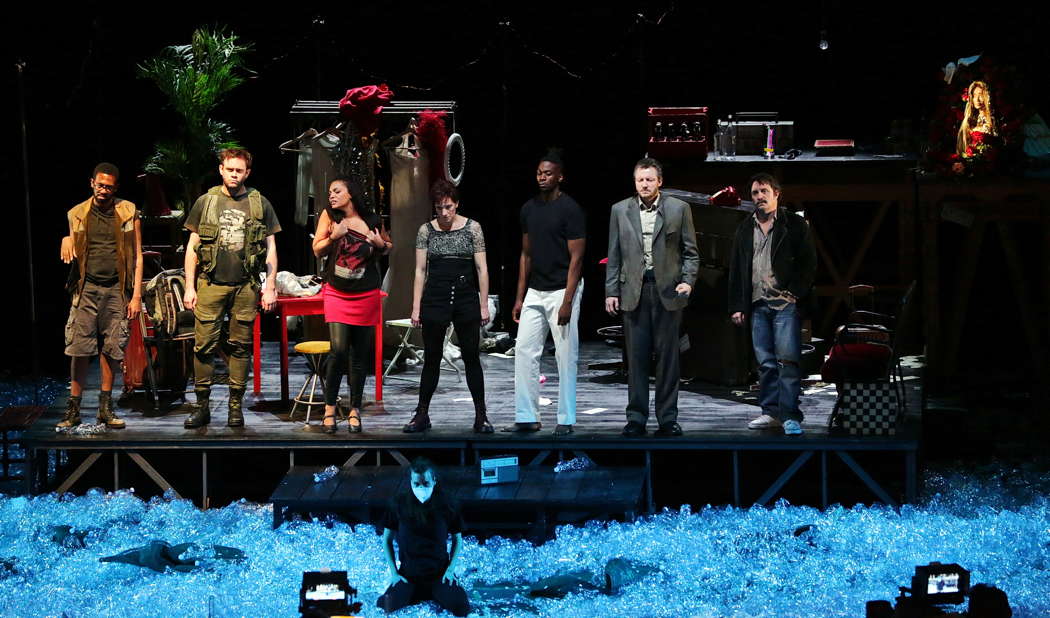- Rudolf Jansen
- Johann Sebastian Bach
- Heinz Holliger
- Chicago Sound
- Gottfried von Einem
- Chilean
- Yury Nikolayevich Grigorovich
- Asian American Pacific Islanders
 VIDEO PODCAST: Women Composers - Our special hour-long illustrated feature on women composers includes contributions from Diana Ambache, Gail Wein, Hilary Tann, Natalie Artemas-Polak and Victoria Bond.
VIDEO PODCAST: Women Composers - Our special hour-long illustrated feature on women composers includes contributions from Diana Ambache, Gail Wein, Hilary Tann, Natalie Artemas-Polak and Victoria Bond.
 SPONSORED: CD Spotlight. Perfect Indeed - More Beethoven from James Brawn, recommended by Andrew Schartmann.
SPONSORED: CD Spotlight. Perfect Indeed - More Beethoven from James Brawn, recommended by Andrew Schartmann.
All sponsored features >>
Deadly Sins
GIUSEPPE PENNISI reports on a Weill/Brecht double bill from La Scala Milan
On 28 March 2021, Italian national television (Channel 5) telecast an interesting double bill produced by La Scala: two short operas by Bertolt Brecht and Kurt Weill, Die sieben Todsünden (The Seven Deadly Sins) and Mahagonny-Songspiel (Mahagonny Song, also known as The Little Mahagonny). The production lasts about eighty minutes. It can be seen and heard at teatroallascala.org or at raiplay.it
It is conceived especially for television or for streaming. The conductor (Riccardo Chailly) and the instrumental ensemble are in the orchestra seats section of the theatre. The action develops in the upfront area of the stage, while on a screen above, tracks of black-and-white movies are projected. Irina Brook is the stage director, Arnalda Canali the television director.

A scene from the Brecht/Weill double bill at Teatro alla Scala. Photo © 2021 Brescia e Amisano
These operas are seldom performed; I remember a production of Die sieben Todsünden at the Teatro Lauro Rossi in Macerata some fifteen years ago; Mahagonny-Songspiel anticipates Aufstieg und Fall der Stadt Mahagonny (The Rise and Fall of the City of Mahagonny) which, instead, is frequently on the billboards. I recall productions I reviewed in 2012 (Berlin) and 2015 (Rome) for this magazine's predecessor.
It is useful, therefore, to write a few lines about their contents. Die sieben Todsünden is a satirical ballet chanté ('sung ballet') in seven scenes (nine movements, including a prologue and epilogue) composed by Kurt Weill to a German libretto by Bertolt Brecht in 1933 under a commission from Boris Kochno and Edward James. It tells the story of two sisters, Anna I and Anna II. Anna I, the singer, is the principal vocal role. Anna II, the dancer, is heard only infrequently. The text hints at the possibility that the two Annas are the same person: To convey the ambivalence inherent in the 'sinner', Brecht splits the personality of Anna into Anna I, the cynical impresario with a practical sense and conscience, and Anna II, the emotional, impulsive, artistic beauty, the saleable product with an all too human heart. The two girls leave the village in Mississippi where they live to tour seven major American towns: each town is a deadly sin. 'The Family', a male quartet, fills the role of a Greek chorus. They refer to Anna as a single daughter of the family, making a verbal allusion to her divided nature: 'Will our Anna pull herself together?' The music ranges from German expressionism to American jazz.
Die sieben Todsünden had its debut in Paris. Lotte Lenya (Anna I) and Tilly Losch (Anna II) played the lead roles. The production went to London. The work was revived by Weill's widow, Lotte Lenya, in the 1950s. It has been recorded, among others, by Anne Sofie von Otter, Teresa Stratas and Anja Silja.
Mahagonny-Songspiel is a small-scale 'scenic cantata' written by Weill and Brecht in 1927 when they were working on the larger project Aufstieg und Fall der Stadt Mahagonny. It is based on five 'Mahagonny Songs', which had been published earlier in the year in Brecht's collection of poetry. It had its debut at the German chamber music festival at Baden-Baden in 1927. Brecht was the director, Lotte Lenya was the protagonist, Jessie.
The production is quite enthralling and reflects Brecht's communist views on society. There is a single set: a boat or a basement - it is not clear - quite scrappy, representing the degeneration of society, the triumph of sensualism and the decay of bourgeois art. There is no dancing. The singers, however, act and move almost as if they were dancing. The protagonist is the mezzo Kate Lindsay, a very good singer and, in spite of her young age, a consummate actress, like Lotte Lenya used to be. Anna II, as performed by the soprano Lauren Mitchell with rather sexy movements, was quite good. The four men are Elion Carlton Hine, Andrew Harris, Matthäus Schimdlechner and Michael Smallwood - a perfect little chorus.

A scene from the Brecht/Weill double bill at Teatro alla Scala. Photo © 2021 Brescia e Amisano
Riccardo Chailly's conducting is very clear and transparent, but I wish it had been somewhat faster and brisker.
Copyright © 29 March 2021
Giuseppe Pennisi,
Rome, Italy

FURTHER ARTICLES ABOUT LA SCALA MILAN
FURTHER ARTICLES ABOUT GERMANY AND GERMAN MUSIC
TWENTIETH CENTURY CLASSICAL MUSIC ARTICLES


